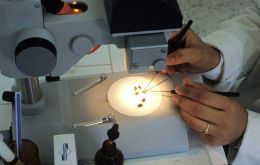MercoPress. South Atlantic News Agency
Health & Science
-
Tuesday, August 5th 2014 - 06:58 UTC
World Bank pledges 200 million dollars to combat the West Africa Ebola epidemic

With the latest death toll from the West Africa Ebola epidemic now at 887, the World Bank Group pledged on Monday as much as 200 million dollars in emergency funding to help Guinea, Liberia, and Sierra Leone contain the spread of Ebola infections, help their communities cope with the economic impact of the crisis, and improve public health systems throughout West Africa.
-
Saturday, August 2nd 2014 - 08:02 UTC
US scientists discover hub of brain cells, in mice, that controls the desire to eat

US scientists have discovered a central hub of brain cells that may put the brakes on a desire to eat, a study in mice shows. And switching on these neurons can stop feeding immediately, according to the Nature Neurosciences report.
-
Saturday, August 2nd 2014 - 07:56 UTC
Ebola outbreak 'out of control' but 'can be stopped' said world's top health official

West Africa's Ebola outbreak is out of control but it can be stopped, World Health Organization chief Margaret Chan said on Friday at a meeting in Conakry, capital of Guinea.
-
Saturday, August 2nd 2014 - 07:48 UTC
Growing concerns the Ebola outbreak could spread globally by travelers

Concerns have been expressed about the possibility of the current Ebola outbreak spreading globally after an infected airline passenger introduced the deadly virus to Nigeria. All outbreaks since 1976, when Ebola was first identified, have been confined to rural and forested areas in Africa, with the previous highest death toll being 280.
-
Friday, August 1st 2014 - 14:52 UTC
Five industries worried about peak oil

The debate over the impact of peak oil has been raging for decades. Although few deny that the end of mass oil consumption is drawing nearer, educated estimates now range between 2020 and 2030.
-
Monday, July 28th 2014 - 07:52 UTC
The New York Times calls for legalizing marihuana: “Repeal prohibition again”

The New York Times called for the legalization of marijuana, in a bold editorial comparing the federal ban on cannabis to Prohibition. The prestigious publication said pot laws disproportionately impact young black men and that addiction and dependence are “relatively minor problems” -- especially when compared with alcohol and tobacco.
-
Tuesday, July 22nd 2014 - 23:17 UTC
China outdated meat supplier scandal hits McDonald's and KFC

Chinese branches of fast food chains, including McDonald's and KFC, have stopped using meat from a supplier in Shanghai following allegations it sold them out of date meat. According to Xinhua, the state-owned news agency, authorities in Shanghai have ordered the suspension of operations at Shanghai Husi Food Co.
-
Saturday, July 12th 2014 - 10:40 UTC
UN members pledge to combat avoidable non-communicable diseases and preventable deaths

UN Member States have reaffirmed their commitment to take bold measures to reduce the avoidable burden of non-communicable diseases. These ailments, including heart disease and stroke, cancer, diabetes and lung disease kill 38 million people every year, many of them before they reach the age of 70.
-
Monday, July 7th 2014 - 22:49 UTC
FAO/WHO elaborating new guidelines for identifying food-borne parasites

A “Top Ten” list identifying the food-borne parasites of greatest global concern has been released by FAO, and new guidelines are being developed to control them. The parasites affect the health of millions of people every year, infecting muscle tissues and organs, causing epilepsy, anaphylactic shock, amoebic dysentery and other problems. Some can live on in our bodies for decades.
-
Friday, June 20th 2014 - 06:29 UTC
Antibiotic-resistant “superbug” detected South Korea raw squid

A dangerous antibiotic-resistant “superbug” has been found in the North American food supply for the first time, according to researchers from the University of Saskatchewan.